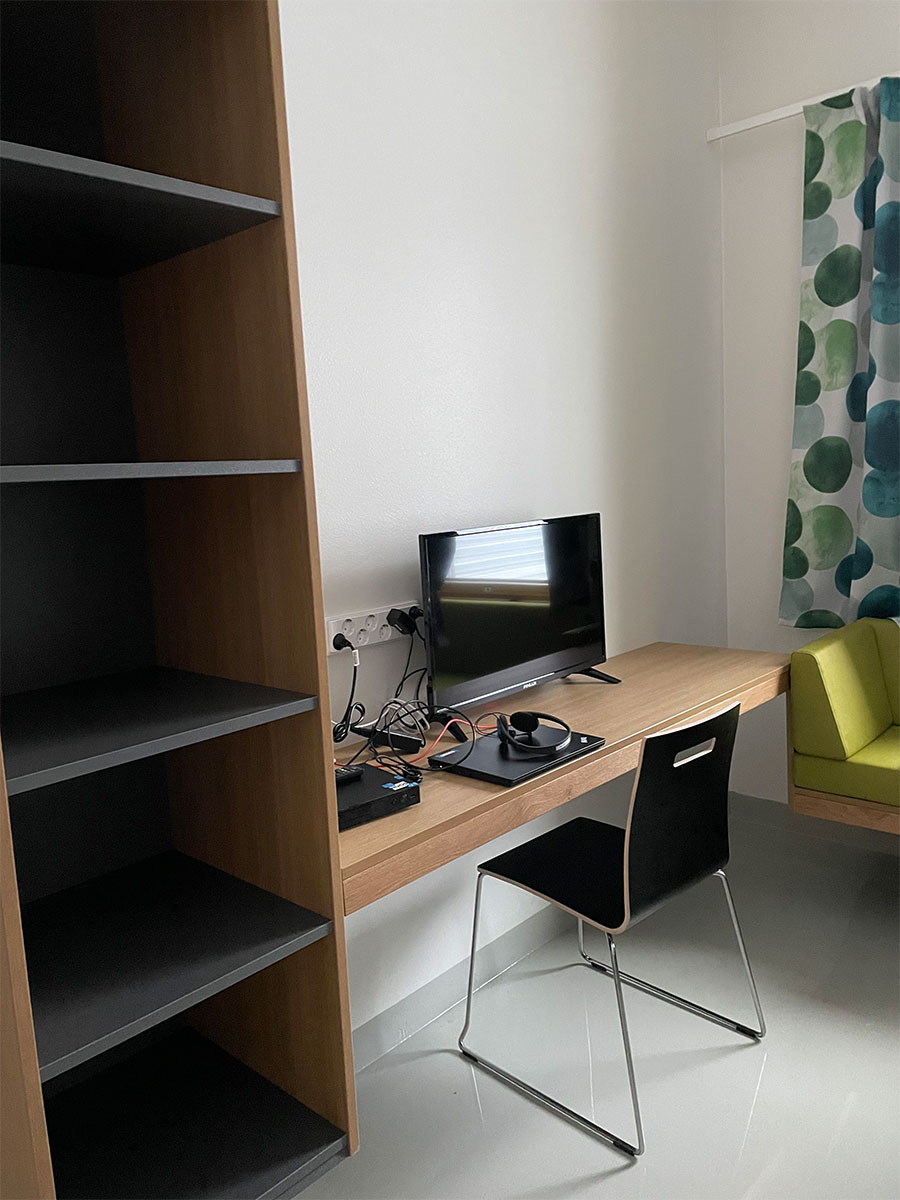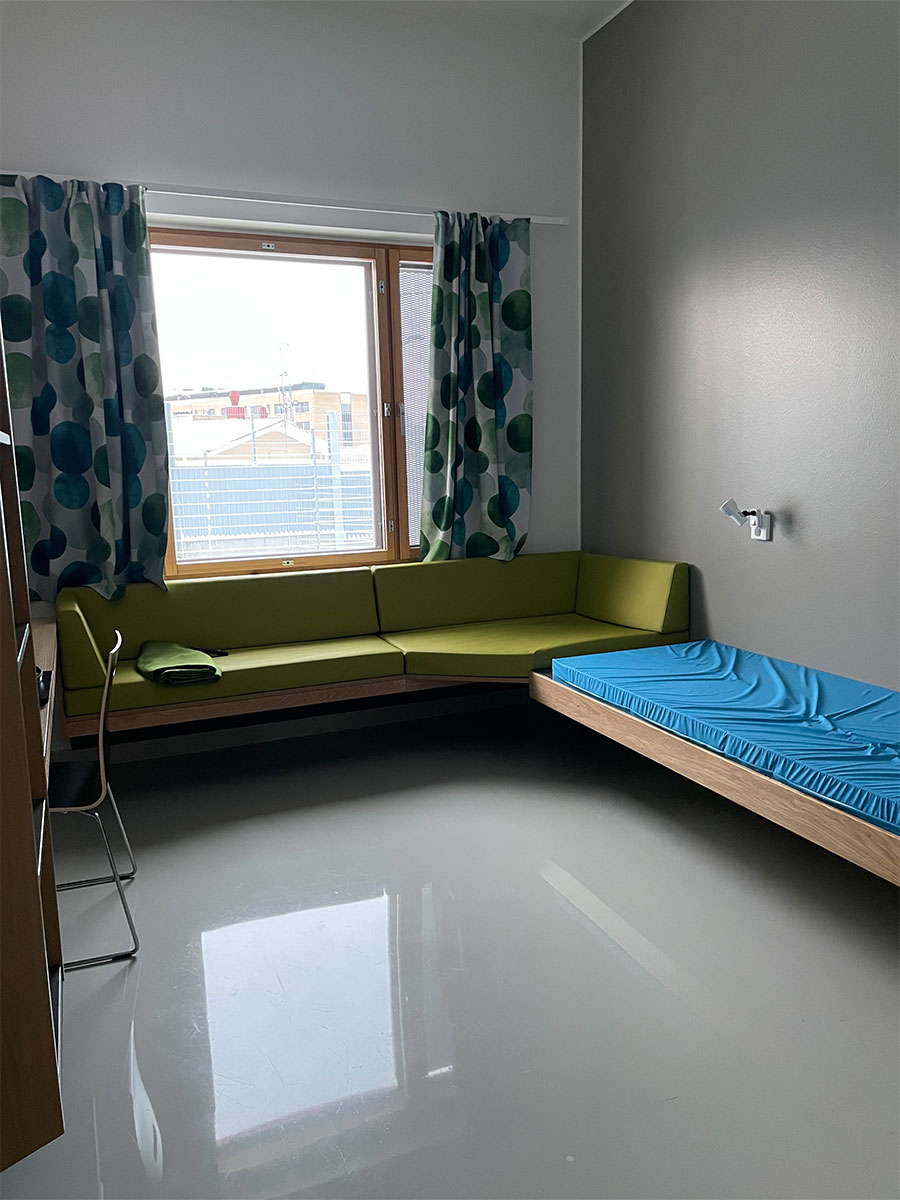Article
Pia Puolakka
First year of the smart prison
The first year of the Finnish Smart Prison has been full of work and testing and implementing new digital services in Hämeenlinna women’s prison. Cell devices were implemented in March 2021.
Each of the one hundred prison cells has a cell device that prisoners use to communicate and manage things inside the prison – and, to a limited extent, also outside of the prison.
At the end of 2021, a structured digital survey was conducted to both staff and prisoners about the user experiences of this cell device system called PriSec. Prisoners found the cell device easy to use. Furthermore, they were happy with the staff’s support in learning the system.
E-books, audiobooks and video visits with close ones are popular.
In 2022, we will implement the prisoner email system in PriSec. Emails are something prisoners eagerly look forward to.
PriSec has also brought changes to staff’s workflows like smoothness, speed and real-time flow of transactions, communication and information. Furthermore, in the COVID-19 pandemic, PriSec was also a great asset. Various partners, like NGOs, used video visits to provide rehabilitation, as face-to-face visits and cooperation from outside the prison have been restricted.
We intend to train staff further for new work practices and conduct more research about the effects of Smart Prison regarding the cost-effectiveness of the new processes. Moreover, one step further will be taken to go to the next level of digitalisation with Artificial Intelligence (AI) in corrections.
Prisoners using, learning and training artificial intelligence
Smart Prison provides various activities to prisoners, and the latest new services are related to using, learning and training Artificial Intelligence (AI). AI in corrections is a new and controversial topic that can bring many benefits but poses many ethical questions before implementation. However, Smart Prison is already functioning as a pilot environment for new AI services, further highlighted here.
Using Virtual Reality (VR) for rehabilitation
The virtual reality (VR) pilot has been conducted in three prisons, including the Smart Prison. Prison psychologists provide VR as part of the rehabilitative work with prisoners. The VR environments include a virtual forest provided by a research team at the University of Tampere and other outdoor environments intended to provide stimulation and activities or well-being and relaxation.
In the Smart Prison, we will also test the virtual forest in a special ward for substance abuse rehabilitation. The preliminary results reveal that prisoners can benefit from VR experiences to elevate and manage their mood and face new and challenging situations in a secure setting.
We intend to use new VR environments in 2022 in collaboration with Helsinki University Hospital and the Finnish Institute for Health and Welfare. The idea is to provide VR for anxiety and aggression management. Involving VR as a tool to assist the rehabilitative and psychological practices already available in prison has been a good way to implement new technology, and there are many possibilities to use it further.

Learning AI with online courses
All prisons and all probation offices are provided with joint use workstations that provide access to several websites for social, educational and healthcare purposes.
There are three online courses on AI provided by Helsinki University and Reaktor among these services. These online AI courses are free and available for open study (MOOC: massive online open course).
In the Smart Prison, inmates can use their cell device for studying these courses’ materials, including Elements of AI (basic course), Building AI (advanced course including basic programming skills) and Ethics of AI. Besides AI, these courses enable prisoners to learn and test their digital and other cognitive skills related to literacy, problem-solving and abstract thinking.
It’s also possible to include these courses into university studies if prisoners are involved in those already during their sentence. Study counsellors in prisons have done a great job in promoting these courses, and completing the basic course has been recommended to staff too. In one prison, prisoners completed the basic course together in small study groups assisted by a staff member.
Elements of AI has already trained more than 1% of the Finnish population on the basics of AI, which was the challenge set by the Helsinki University. The course has spread worldwide, currently to 170 countries in 21 languages with 700 000 registered users.
The next challenge is to train 1% of the EU citizens. We hope prisoners and prison staff will also attain this 1% leap in AI literacy.
Regarding the ethics of AI, AI literacy can be considered as an important part of making AI understandable and ensuring its transparent use in the future.
Training AI – Document processing as prison work
The latest AI-related activity is document processing work for a software company operating in Finland. By processing documents on workstations provided by the company, prisoners train algorithms to detect words and meanings in written documents. These allow automated service recommendations.
During 2022, we will be piloting this kind of work in three prisons as part of prison work, including in our Smart Prison. This type of work is intended for prisoners unable to do physical work or work among other prisoners. Document processing offers also training in basic literacy and concentration, which are challenging to many prisoners.



AI in offender management
The latest initiative in the Smart Prison project is RISE1 AI, a recommender system to be implemented in our new offender management system (OMS), in 2022.
RISE AI is an algorithm that analyses relevant offender background factors (criminogenic factors, risk factors and strength factors).
Then, based on the resulting information, the algorithm recommends the most suitable services and activities for each offender during sentence. This algorithm will be an assessment and recommendation tool for senior coordinators responsible for the sentence planning process. In the Finnish Criminal Sanctions Agency, this is done in special Assessment Centers. Ethical questions and possibilities to study the effectiveness and effect of RISE AI in various sentence processes are to be considered carefully before implementation.
The training of staff responsible for the use of RISE AI is also a vital part of the implementation project. RISE AI is not supposed to be automated decision making but a tool based on expert knowledge and statistical data to analyse offenders and assist staff workflows.
RISE AI is working in collaboration with the national Artificial Intelligence programme Aurora AI, conducted by the Ministry of Finance.
Aurora AI is a recommender system for public services to help citizens find necessary and relevant services in a timely and ethically sustainable manner.
The goal is that offenders could also use this recommender system with staff’s assistance to find suitable public services, especially after being released from prison, and because more and more collaboration with public services is also done during the sentence.
Second smart prison in 2022
Smart Prison project continues in 2022: we will have a second Smart Prison in Pyhäselkä prison, in East Finland, in October 2022. The digitalisation of Finnish prisons goes on. Stay tuned!



Pia Puolakka
Pia Puolakka is the project manager for the Smart Prison project at the Finnish Criminal Sanctions Agency. She has been working for the Finnish Criminal Sanctions Agency since 2012, having started as a psychologist in prisons. Since 2017, she has been working in the central administration, where she first served as a senior specialist in rehabilitative services, including programme work, family work and psychological and spiritual services in prisons. Pia is a forensic psychologist and psychotherapist. She has also studied artificial intelligence. She is a Board member of the EuroPris ICT Expert Group.


